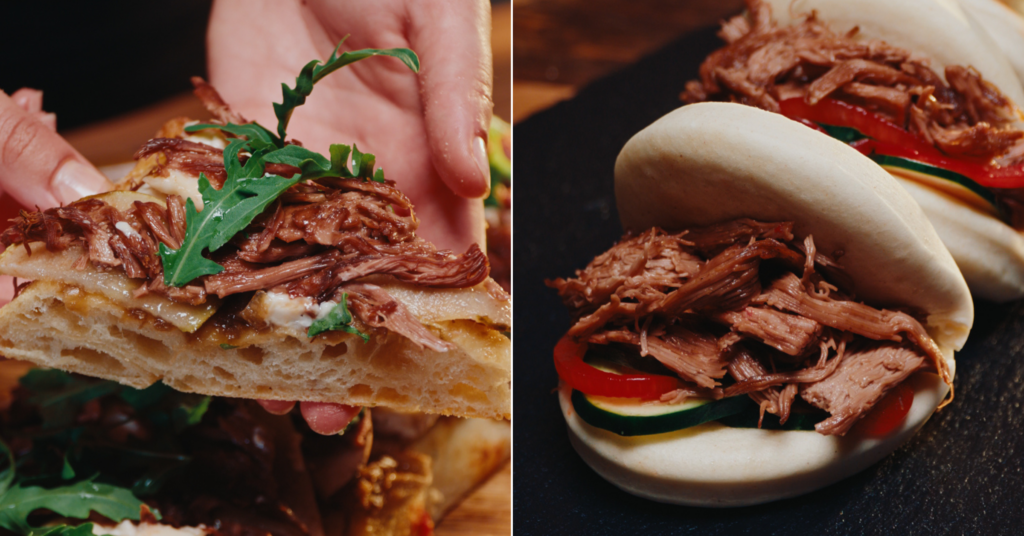Novameat Closes $19.2M Series A Round, Revamps Plant-Based Shredded Beef with Better Texture
5 Mins Read
Spain’s Novameat has attracted €17.4M in a Series A funding round to expand its plant-based meat range based on MicroForce technology, starting with a revamped shredded beef offering.
Catalan food tech startup Novameat has received €17.4M ($19.2M) in an oversubscribed Series A investment round, taking its total raised to $25.6M.
The capital injection was led by Sofinnova Partners and Forbion via its BioEconomy Fund, and included follow-on investments from Unovis Asset Management, Praesidium, and Rubio Impact Ventures.
Novameat aims to use the funds to expand to new markets, scale up its production capacity, and introduce new products – for the latter, it is starting by reformulating its Shredded Nova-b*ef, which has an improved taste and texture with a competitive price tag.
“We will be expanding our commercial presence across Europe, with an initial focus on regions where we are seeing strong traction from foodservice and manufacturing partners seeking superior products in terms of taste and nutrition,” Novameat founder and CEO Giuseppe Scionti told Green Queen.
“Once we establish a solid foothold in Europe, our strategy includes expanding into North America and the Asia-Pacific, where we plan to leverage our unique technology and product offerings to build key distribution and production partnerships,” he added.
How Novameat is delivering on texture with MicroForce technology

Novameat burst onto the scene in 2018 with a 3D-printed whole-cut vegan steak, and showcased an improved version two years later that featured a combination of tissue engineering and technology that enabled micro-structured tridimensional 3D printing.
But its current lineup – sold to foodservice operators in Spain, the UK, and the Netherlands – includes a chicken fillet, pulled chicken, deli-style turkey, and the aforementioned shredded beef. It is among a number of startups producing whole-muscle meat analogues, often described as the “holy grail” of plant-based meat.
The company’s manufacturing process is based on its MicroForce technology, an iteration of 3D printing adapted for large-scale food production. “We use standard food industry equipment with some patented tweaks to achieve the same fibrous texture as 3D printing, but on a much bigger scale,” explained Scionti.
“Unlike many other plant-based meats, we don’t need to use additives like methylcellulose or carrageenans to get the right texture and our process builds the texture. Plus, all our ingredients are natural and retain their full quality due to the low temperature and pressure during production,” he added. “This gentle process, along with our premium ingredients, means there’s no bitter aftertaste, offering a clean, satisfying experience every time.”
This plays to an important trend – globally, the texture of plant-based meat is as important as their conventional counterparts for 75% of consumers, but only about 60% are actually satisfied with it.
This technology has also been fine-tuned to enhance the texture and mouthfeel of Novameat’s shredded beef offering. “The fibrous structure has been upgraded to deliver an authentic ‘pulled’ consistency. We’ve also optimised the natural flavour profile, making it a versatile meat alternative suitable for a wide range of dishes,” said Scionti.
“Additionally, we’ve improved production efficiency, allowing us to scale up and meet increasing demand while keeping our competitive pricing intact. Feedback from tastings has been overwhelmingly positive, and this version of Nova-b*ef is free from allergens, soy, gluten, methylcellulose, carrageenan, and added sugars,” he added.
This proprietary technology is also what has attracted investors. Alex Hoffmann, general partner at Forbion’s BioEconomy Fund, called it “truly groundbreaking”. “We see significant potential not only in their current products, but also in the pipeline of innovations they are developing,” he said.
Investors focused on scalable solutions backed by strong tech

Novameat’s current capabilities allow it to produce 500 kgs of whole-muscle plant protein per hour, allowing it to supply its meat analogues to caterers like The New Standard and restaurants such as Taquería in London and Disfrutar in Barcelona, voted the world’s best restaurant in 2024.
The fresh funds will take things a step further. “The capital raised will be instrumental in scaling our production capacity, both at our existing facility in Barcelona and through new production partnerships, to meet the growing demand for our products,” Scionti said.
“A significant portion of the funds will also be allocated to accelerating our research and development initiatives, ensuring we continue pushing the boundaries of innovation in creating healthy, high-quality plant-based meats.”
He confirmed that Novameat has no plans to enter retail anytime soon, since B2B offers a “bigger opportunity” at the moment. “We’re witnessing a strong demand from the foodservice and food manufacturing sectors for premium, differentiated plant-based offerings tailored specifically to their unique needs,” he stated. “These industries are seeking high-quality products that deliver on taste, texture, and nutrition while meeting operational and scalability requirements.”
That said, he added: “While we focus on serving these sectors, we will also offer our products through select direct-to-consumer partners.” Novameat recently began selling its products on UK e-tailer Mighty Plants.
The Series A round comes amid an investment slump for plant-based foods – last year, funding in this sector was down by 24% globally, reaching $908M. But while fermentation startups are gaining ground, and cultivated meat is keeping pace, plant-based protein makers are finding it hard to keep investors interested, raising only $138M in the first half of this year.
“Securing investment has undoubtedly become more challenging in today’s plant-based meat market, with a surge of brands launching similar plant-based products that often lack meaningful differentiation,” said Scionti. “Additionally, consumers are increasingly health-conscious, seeking innovative products that offer both superior taste and clear nutritional benefits.”
So how did Novameat overcome these challenges to raise $19.2M? “Investors remain focused on scalable solutions backed by strong technology, like our MicroForce Technology, along with proven consumer acceptance and sound unit economics,” its CEO explained.
“The key to driving the next wave of growth lies in continuously developing products that surpass current offerings in taste, texture, and nutrition, while achieving price parity with traditional meats,” Scionti added.



